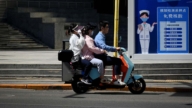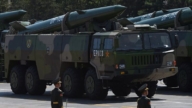【新唐人2013年03月15日訊】中共民政部官員日前表示,將允許民間慈善機構、工商協會、及其他一些非營利民間組織,直接向民政部登記註冊,不必掛靠在黨政機關。但政治法律性質和涉及外國的民間團體,仍然需要經過主管部門審批。
目前中國大陸合法的民間組織約有45萬個,但卻有250多萬個非法組織。那些生長在中共體制下的民間組織,有甚麼樣的成長空間﹖它們又該具備哪些條件才能獲得公正的待遇﹖請看以下這則報導。
中共民政部部長李立國3月13號對媒體表示,民政部門要配合國務院機構改革職能的需要,從行政機關中剝離出一部分職能交給社會。
李立國表示,今後在市場經濟領域和文化領域,一些協會、行會、慈善機構,可以由社會經營,以擴大社會組織在經濟社會發展中的作用。民政部門將會同有關部門,加強對民間團體的登記審查和監管。
國務委員兼國務院秘書長馬凱,在3月10號的的「兩會」報告中也提到:成立行業協會商會類、科技類、公益慈善類、城鄉社區服務類社會組織,可以直接向民政部門依法申請登記,不再需要業務主管單位審查同意。
中國「權利運動」網站負責人 胡軍:「它跟大部制改革一樣的,它總是想做出一種新的東西出來。但是,如果中共實質東西不做改變,這些東西……基本上處於作秀形式,不會起到多大的作用,因為它的嚴格審查制度。」
胡軍認為,如果沒有獨立黨派介入,民間組織的作用不會跟以前有甚麼區別。他指出,如果中共哪天不刪貼了,大家不會因為說話而受到打擊,說話也沒有恐懼了,那麼不需要「鬆綁」,民間組織也會自我生長。
目前,中國大陸合法的社會組織約有45萬個。但有學者估計,另有250多萬個民間組織處於「非法狀態」。
近年來,要求降低民間機構登記門檻,為社會組織「鬆綁」的呼聲日漸高漲。但目前,在中國像從事民間愛滋病防控工作、民間環保組織等草根組織,依然很難通過登記註冊獲得合法資格。
其實,早在2011年12月,民政部部長李立國就已經聲明,那些推行公益慈善、社會福利、社會服務等領域的社會組織,可以直接向民政部門申請登記。
中國憲政學者陳永苗:「它內在有一個控制在那裏,而且很多涉及到可能危害社會安全的或危害國家政治安全的,它是不會批的。然後會批的都是那些花鳥協會、或者是有掛靠單位的、沒有涉及到政治的東西。基本上那些公益人士、公益組織,甚至沒有涉及到政治的公益組織都批的極少極少的。」
中國憲政學者陳永苗還指出,中共對民間社團組織的管理,實際上一直按處理國內政治安全保衛的那種高度進行,並且,民政部想探索民間組織管理的方式是否能與其他部門協作,目前也看不清有甚麼進展。
另一方面,中國民間維權網站《六四天網》負責人黃琦認為,以後會在管理上放開的民間組織,主要是指那些官方認可、或官方自己通過官員所建立的那些所謂NGO組織。而從事人權工作的NGO組織,中共將會一如既往的繼續打壓,至於那些帶有政治敏感性質的NGO更會受到官方的判刑。
據美國非政府組織「對華援助協會」的報告顯示,2012年全中國家庭教會被迫害案件有132件,比2011年上升41%,受迫害總人數4,900多人,包括236名教會領袖,9人被判刑。
而今年,黑龍江、山東等地依然出現家庭教會被打壓事件。
看來,中國民間組織獲得公正待遇,還有很長的路要走。
採訪/朱智善 編輯/宋風 後製/蕭宇
Deregulation on Registration of Some Civil Groups in China
Recently, a Chinese Communist Party (CCP) civil affairs
official alleged that some non-profit organizations can
directly apply for registration in the civil affairs department.
Civil groups are no longer required to have administrative
affiliation to the Party, nor to governmental organs.
Yet, non-governmental organizations (NGO) involved
in politics, law and international issues will remain
subject to approval by superior administrative authorities.
Currently, China has about 450,000 registered civil
groups, and over 2.5 Million NGO’s cannot register.
How much ability, under CCP rule, do
civil groups in China have for growth?
How can they become legible in order
to get fair treatment? Let’s see the details.
On March 13, Li Liguo, CCP Civil Affairs Minister, told media
that the ministry will echo government restructuring plans.
That is, separating some administrative
functions and return them to the society.
According to Li Liguo, in the future some
organizations can be operated non-officially.
This includes associations, guilds and
charities in fields of economy and culture.
He said that this is to expand their roles
in economic and social development.
Li adds that the civil affairs departments, jointly
with relevant organs, will strengthen inspection
and supervision of NGOs registration applications.
On March 10, Ma Kai, secretary-general of State Council,
commented in a report given at the Two Sessions.
He said that setting up social groups in
the following categories can directly apply
for registration in civil affair departments.
The scope covers industry associations, chambers
of commerce, civil groups of science & technology,
of charity, and of urban and rural community service.
In these applications, approvals from superior
administrative authorities are no longer required.
Hu Jun, Chief of NGO Human Rights Campaign in China:
“It’s the same as the big-ministry reform,
intending to make novel changes.
But if the fundamental nature of the CCP
remains unchanged, they are merely for show.
It helps nothing under its strict censorship system.”
Hu Jun indicates that without the existence of independent
political parties, the role of NGOs won’t make any difference.
He says that if one day the CCP won’t remove online
posts, and no citizen will be the target of crackdown
for free speech, civil groups will inevitably develop
well even without the regime’s deregulation.
Currently, China has about 450,000 registered NGOs.
Scholars estimate that over 2.5 million
civil groups are still “illegal" in the country.
In recent years, appeals for lowering the barrier
for civil groups’ registration have been on the rise.
Yet until today, civil grassroots groups that engage in
AIDS prevention and environmental protection have
still found it hard to become registered in China.
In fact, Li Liguo made the same
proposals in December 2011.
That is, civil organizations involved in charity,
social welfare, and social services can directly
apply for registration in civil affairs departments.
Chen Yongmiao, constitutional scholar, China:
“It has a criterion for approval of registration.
It won’t approve those organizations that
it deems may endanger the regime’s rule.
It usually grants eligibility to associations of aviculture
and floriculture, and to those that aren’t related to politics.
For non-profit organizations, basically, few
applications for registration can get approval.”
Chen Yongmiao adds that all along, the CCP has dealt
with civil groups from a point view of stability of rule.
Moreover, concerning Civil Affairs Ministry’s collaboration
with other departments to administrate civil groups,
there’s no clear progress being made so far, he says.
Huang Qi, head of the rights defense
website 64tianwang.org, commented.
He says, the deregulation of civil organizations refer
to those NGOs that have official approval or that have
been set up by officials on behalf of the authorities.
Huang Qi believes that rights-defense NGO’s
will still be the target of CCP crackdowns.
And those NGO’s involving politics will even
risk the regime’s punishment, says Huang.
US-based NGO China Aid Association’s report shows
that in 2012, there were 132 cases of persecution
affecting Chinese House Church members.
This represents a 41% increase from 2011.
The number of victims exceeded 4,900, including 236
church leaders, with nine persons being sentenced.
In 2013, continuous crackdown on the Chinese House
Church remains in Heilongjiang and Shandong provinces.
It seems that China’s civil groups still have a long
way to go before the arrival of justice and equity.




























